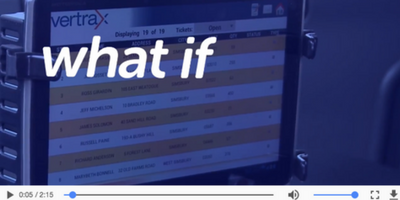.png?width=1024&name=Vertrax-%20%23%20Ways%20to%20Eliminate%20Unnecessary%20Miles%20for%20your%20Fleet%20(1).png)
Every mile you put on your fleet costs your business money. This starts with your fuel usage. The American Transportation Research Institute (ATRI) reported in 2014 that fuel costs “generally account for approximately 30 to 40 percent of a motor carrier’s CPM (cost per mile).” Then you also have to deal with increased wear and tear on a fleet. The more mileage a fleet gets, the more likely you will have to make repairs. Your warranty will also run out more quickly, which will leave you fitting the bill on those repairs all too soon. So how can you cut down the amount of unnecessary miles on your fleet? Here are some industry approved solutions.
Optimize Scheduling
When you optimize your delivery schedule, you avoid extra miles due to improper routing. Transportation and Logistics International explains how your drivers and dispatchers are able to coordinate everything out using strategic transportation planning. Every driver on your fleet is fully aware of each stop they have to make. Your dispatchers are key to implementing this by scheduling drivers with routes that best fit their location and time table. One way to devise an efficient and automated system for improving your scheduling is with logistics software. The software is key to catching any overlaps or miscalculations, which would otherwise disrupt your drivers’ schedules.
Tracking and Routing Technology
Speaking of scheduling deliveries, the top way to cut out unnecessary miles is to improve routing. Thanks to mobile trucking technology you can provide your drivers with more than just a portable GPS system. Trucking tech gives you the ability to track your trucks and map out their routes. This serves two purposes. For starters, it keeps your drivers on top of their routes. If they are being monitored this gives them an incentive to stay on the right path.
Another benefit of truck tracking technology is that it allows your drivers and dispatchers to identify the most common route for regular deliveries. Then they can evaluate whether a different route would be more efficient based on the data. You can also use mobile trucking tech to track seasonal weather conditions, traffic based on the time of day, and other variables. Using technology allows your dispatchers to devise routes that take the roads less traveled, literally, so that your drivers are able to arrive in the least amount of miles.
In Transit Rerouting
Here’s a big issue that causes fleets to rack up extra miles. Your drivers are out for deliveries when there is a change of plans, forcing them to reroute mid-transit. In most instances this will result in adding up wasted miles as the driver tries to find a way to get to their new destination. Yet this happens all of the time, which is why you want to be on top of it.
And, no it’s often not the fault of your drivers and dispatchers, but the reality of the needs and expectations of customers. For instance, your dispatcher gets a call from an industrial manufacturer who has suddenly run low of propane and needs to fill up the tank to be able to complete an order for their own customer. These types of emergencies happen regularly in the fuel and oil industry, which is why you need to plan accordingly.
The Benefit of Trucking Technology
This is also where your use of mobile trucking technology and logistics software comes onto the scene. When you have coordinated schedules and determined routes using trucking technologies, your logistics team stands a far better chance of completing the rerouting with efficiency. This means fewer miles are wasted, and your fleet comes out on top with its CPM.
Enjoy learning about the how to eliminate unnecessary miles for your fleet? Learn more about what Vertrax can do to help you get to these results and achieve the benefits.


